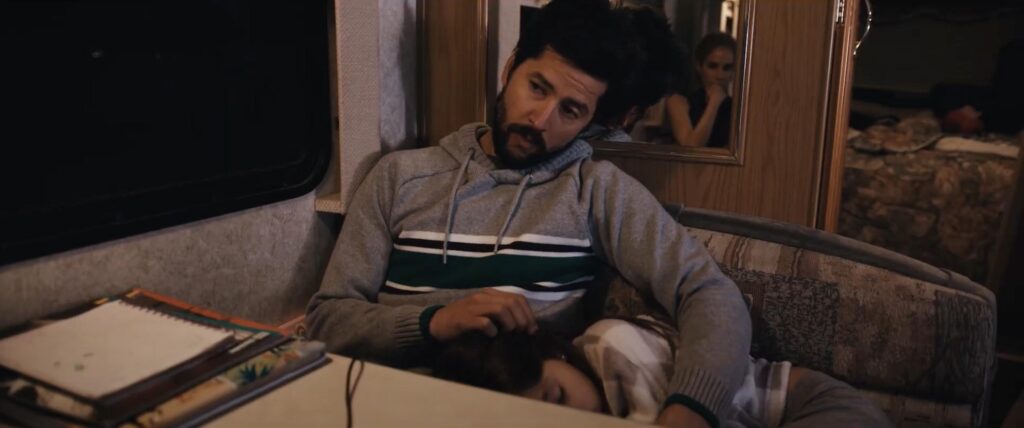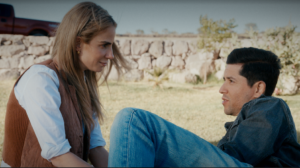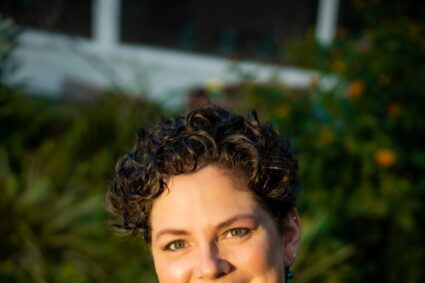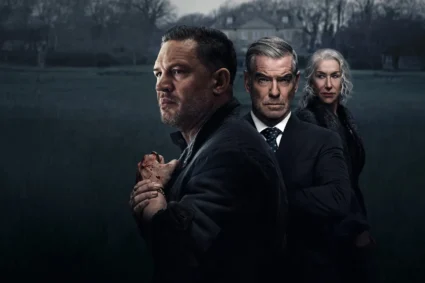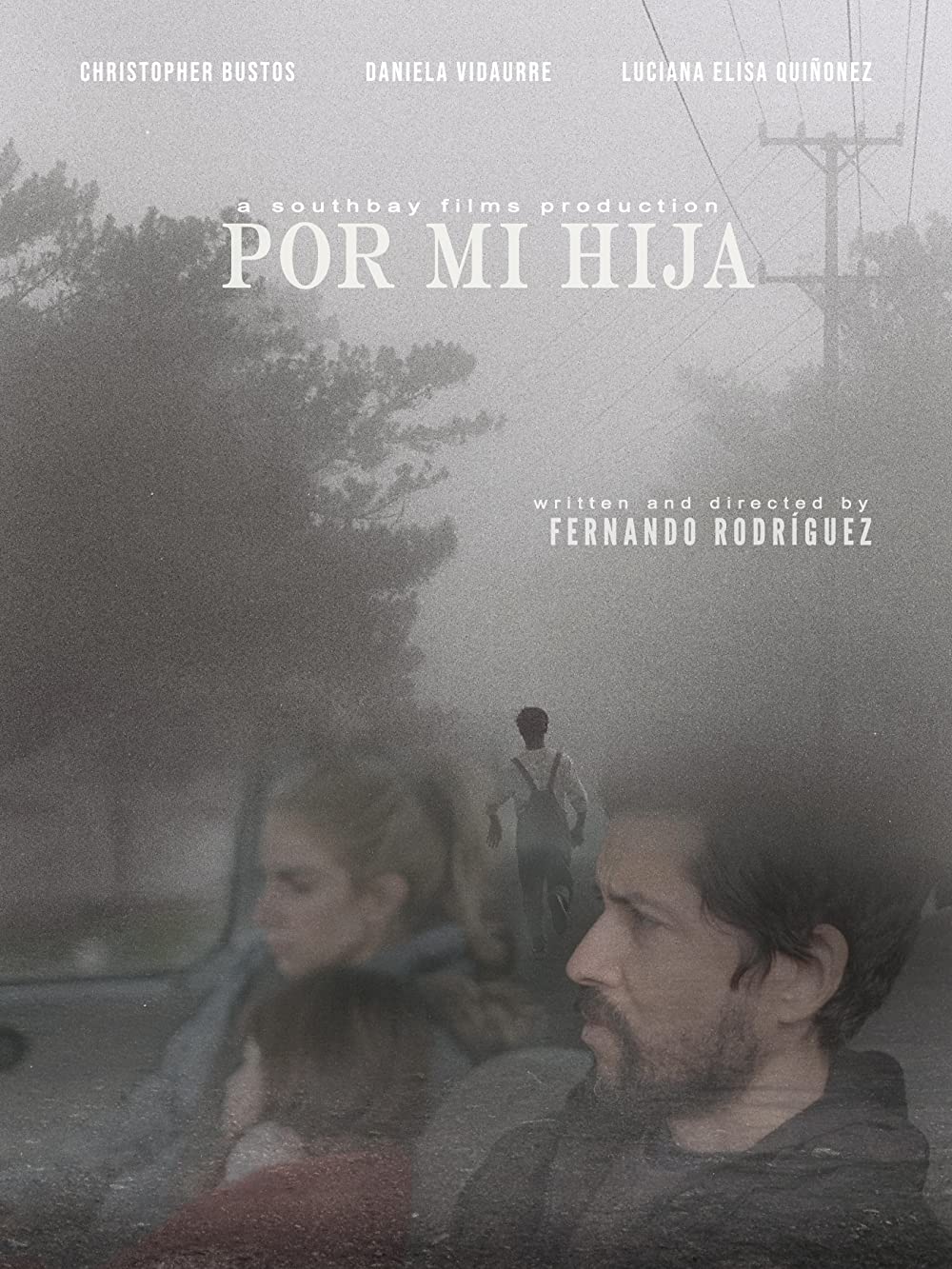
On this edition of THE INTERVUE, we delve into a movie that was recently released called For My Daughter (Por Mi Hija). A young couple from Mexico decide to come to the U.S. in search of the American Dream. Illegals in a foreign country, no family, no friends. Soon, they are forced to confront the choices they have made.
I recently sat down virtually with writer/director Fernando Rodriguez, and actor Christopher Bustos to talk about this powerful and touching tale of a family who learn the American dream isn’t all it seems.
Fernando, this movie illustrates the harsh reality of immigrants who face all kinds of obstacles as they cross the border and as they live in the United States without legal status. Where did the inspiration for this film come from? Is it something personal or based on some real-life story?
Fernando Rodriguez (Writer/Director): It’s both. I was born in the United States, but my parents are from Mexico, I grew up in San Diego, California, which is on the border with Tijuana, which is the largest border in the world. As a child, I witnessed emigration firsthand, watching with my own eyes people crossing the border illegally and hiding behind trees. I remember very clearly walking to school and seeing people hiding from immigration agents. When I asked my parents, they replied that one does not understand the truth, all the things are complicated about immigration and politics and the problems still exist with this country.
As one grows, one becomes more aware of the situation. It was a very important issue to me, as a Mexican and as a United States citizen. You can see both sides of the story. As a child, I used to travel to Tijuana, where I had friends who could not cross over to the United States, and it was like two very different worlds. So, it always had a big impact on me.
As I grew up, I met my wife, who is from a small town called Jalostotitlán in Jalisco, and that town is very beautiful and very traditional, with local traditions, the people, and the food the way they are, and that town attracts a lot of people to come to the United States in search of what is often called an “American Dream.” You hear a lot of good and bad stories. One of the stories that left a huge impact on me was that of a couple who came to the United States as newlyweds with their baby and did not have a good time. It was a story whose impact I felt deeply and decided to write from there.
Christopher, what was your role in “For My Daughter”?
Christopher Bustos (Leo): The character I play is Leo, he is a simple, open-minded person from a small town in Jalisco, Mexico, who loves his family, his traditions, and his work. He may not have much experience with the United States, but as someone who has ambitions and dreams, he is naïve, but with goals, dreams, and a longing to see his family grow and get to know the American culture.
Why was it important for you to depict the contrast between how people live in their native land and when they migrate to foreign lands in this movie?
FR: In English, there is an American saying, “The grass isn’t always greener on the other side of the fence” and for me, that means that people sometimes pass on the American dream, I repeat it in quotes as “that the streets are painted gold that money falls from the trees that all the people living in the United States are extremely rich.” Is a very dreamy way of thinking. It is a way, and excuse me if I get the “Norteño”, that is somewhat naive, but it is a foolish way of thinking since it is not based on reality at all.
In reality, this is a country based on work, based on corporations that take advantage of people, especially illegal immigrants who come to this country with little money and without rights, and sometimes just to suffer. People do get ahead through hard work and effort, but at what risk and at what sacrifice? People who come to this country and cannot return if their children die or a loved one dies, leaving their children and their mothers behind. The question is, is it worth it? Do you think it’s worth it living in this country? As they told Leo in the film, here you have everything, we are poor, humble, but you don’t lack anything, you are happy here, you have your family, you have your roots, but sometimes, well, money calls you, opportunity calls you. When Leo learned that his wife was pregnant, his life changed suddenly. When you realize that you are going to be a father, you don’t think about yourself anymore, you think about your family.
So it has had a great impact on me that people take that risk and also because I have never had to do something like that, right, and sometimes I even feel guilty because I had it so easy because I was born here with all the rights that an American has, but Mexicans, Latinos, and others are looking for the same thing, but they do not have the same rights as Americans, and that has really affected me.
Given that you were born here, how did it feel to record this role when witnessing another reality? Was it an impact on you?
CB: Yes, the entire experience of this film recording meant a lot to me. It changed me. As I told you, most of my family is from the border, so I was surprised I had never traveled within Mexico before. I felt like I missed something that didn’t exist there, for me it was something wonderful, I don’t know if it was the character or if it was me. All of it was very beautiful, the city, the people, the culture. From reading the script, I knew this movie would be an extraordinary experience for me and had a tremendous impact on me. All the beautiful scenes and horrible scenes, everything that happened in Mexico that looks beautiful, and everything that I know and live on the other side of the United States as an immigrant. I was very happy.
In the film, you mention racism within your own group of people, which is a major obstacle for many immigrants. What does that mean to you personally?
FR: As I look at that, I took it from personal experiences, more than anything, my father has always shaped my views on life. When he came to this country, he lived in Chihuahua and then moved to Tijuana, looking for the American dream, he knew little English, he talked about the racism at work, not always among gringos, but also among his own Latino colleagues.
As a result, he was impacted and affected for his whole life, by not repeating that never, and when he was able to help somebody who was in the same situation, he was going to do it, because he had faced situations where people spoke to him in English knowing that he doesn’t speak it, and they were able to communicate in Spanish.
This was something that I had a great impact on because I grew up with that same feeling of not taking advantage of anyone who is in a position like that and helping them whenever they need it, simply because one never knows what the future holds, and I decided to include a part of the script since I felt it was an important lesson to convey.
When you were working on the farms, how did that experience go?
CB: My experience there wasn’t difficult, and I really enjoyed working there. The first job I had when I was thirteen or fourteen was not on a ranch, but I had animals and dogs to care for and I kept everything there. This was the work, waking up at six in the morning to do all that to give them food, to clean the same thing for the roosters, it was a different land, it was a big responsibility. I really enjoyed doing those scenes.
How would you describe the values of the families depicted in the movie? Is it possible that broken families are a result of the stress that one faces in this country?
FR: I agree, especially now that we are living through a period of high political frustrations, as we did a few years ago with the migration thing and all the things that happened with Donald Trump. I felt that it was a good time to bring up this topic apart from what normally occurs in a family, a married person, with daily lawsuits on top of that, adding the stress of being an illegal, of not having anyone to talk to, of being scared to go out on the street, all that comes to the surface in this movie and is finally shown as a volcano bursting, since we are human beings and we can only hang on until a certain point.
As I told you, this is a country where it is important to get into the rhythm like the people who live here, or you will sink very fast, and I think that is what the movie means. Because of that, now that they are here, they realize they need to live with the consequences of the decisions they made.
How did you finish making the movie during the pandemic? What was the experience like?
FR: As soon as I finished the script, the pandemic started. Everything started to close everything and so I had to decide without stopping everything. I thought I would commence the pre-production process by looking for actors, starting the process of finding the location, where we would record, and so on. As it turned out, it was very challenging logistically, however it was a positive thing since the whole team was available everyone was off work and locked up and all the actors were willing to go out and do their art, and it lent himself to do what I needed, and we got it done very quickly.
While the trip from Mexico to the United States was somewhat challenging at the time to transport all the equipment, it was possible and I believe if I end up being successful, I have everything I need to conclude the project.
Would you give any advice to all the young people or families who dream of coming to the North?
CB: The fact of them being informed of everything, that they think a lot about their values, about what really matters to them in this life, what they want, whether they stay in Mexico or move to the North, will make things difficult, but when you do something you love, it will lead you in the direction that you love. Do what is best for you first, and then consider what is best for your family. Coming to the United States means you must take more risks.
Would you like to convey a particular message to your audience?
FR: My goal was to make a real movie. I didn’t want to invent things, I just wanted to make a drama that showed, and that people could witness what these people go through every day. Throughout the media on television, we see what’s good just for them and the show the negative aspects of Mexico that people want to come here to steal, to take their money off the Americans, and to come here just to ask for help. In the end, people just want a better life, they want to get ahead, nobody wants to leave their children, their parents, or to leave their culture.
When do they say that they come here to steal from us? The answer is NO! And of course, there are people who come here to do all sorts of things, but most people come here to work, to get ahead, and be realistic, statistically, most people come here to get ahead.
In addition, I would love for audiences in the United States to watch it and see the other side of the coin, which is not just what they see on Fox News or other outlets – and to see what a town in Mexico is really like. They can see what people risk, their families, and the young people to be able to seek a better future. They can also see what they leave behind and what they live by being here. With the documentary style I wanted, I wanted to portray it in a real and strong way. I wanted to portray it almost like you are there with them in the beautiful moments as well as the ugly ones.
Also, I’d like people from all over the world to see it, since the film will not only be released in the United States but will also be released in Latin America and shortly in Spain, and I’d like people from other countries to see it as well.
For My Daughter (Por Mi Hija) now available on digital platforms and on DVD
